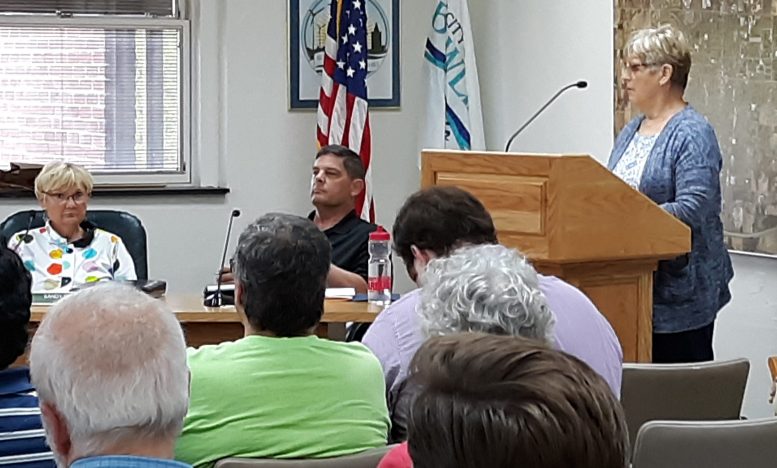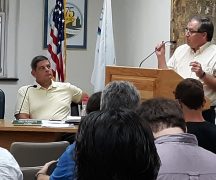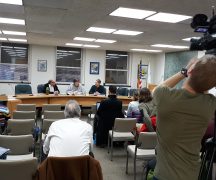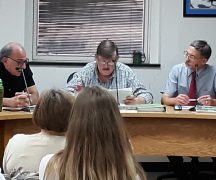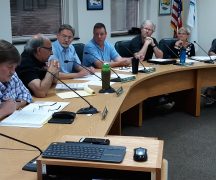By JAN LARSON McLAUGHLIN
BG Independent News
By a vote of 6 to 1, Bowling Green City Council agreed to proceed with a ban on single-use plastic bags. And by a closer vote of 4 to 3, council agreed to decide on the ban themselves rather than put it on the ballot this fall.
Their decisions came after another round of citizen input – ranging from a resident accusing them of turning Bowling Green into a socialist city, to others who praised council for trying to make a difference – no matter how small it may be.
The plastic bag ban will be set to go into effect on Jan. 1, 2021, with enforcement to be assigned to the police division’s civil code enforcement staff. Legislation is expected to be presented soon.
The lone vote against the plastic bag ban came from Greg Robinette, who said that 100 percent of the people who have spoken with him privately are opposed to the ban.
“I’ve seen no data that can tell us what the citizens of Bowling Green think about this issue,” Robinette said.
But the other council members said they heard different reactions from citizens – during the public hearings, through emails, and in person.
“This is a small step for a small city to take,” Council member John Zanfardino said, mentioning the lack of environmental protection being undertaken by the federal or state government. “It’s incumbent upon small localities to deal with it.”
Council member Bruce Jeffers agreed that banning plastic bags would just be a small step. But it would be a step in the right direction.
“We do a lot every day to pollute our environment,” he said. “This is just the tip of the iceberg in Bowling Green. It’s just a small sliver.”
Council President Mike Aspacher said he heard mixed opinions from citizens.
“But at the end of the day, all of us have a responsibility,” Aspacher said. “There’s no reason change can’t begin in Bowling Green.”
Several council members voiced concern about the state legislature’s proposed House Bill 242, which prohibits municipalities from enacting plastic bag bans.
Council member Sandy Rowland said as a “home rule state,” Ohio cannot tell cities how to handle such issues.
“I don’t want us to be a ‘wuss’ and back down,” she said about the state’s effort to usurp local power. “We are sick and tired of having you tell us what we can and can’t do.”
City Attorney Mike Marsh is also troubled by the state legislature’s efforts to preempt city authority.
“I share some of your concern about the state trodding on home rule of the constitution,” he said.
However, Marsh added that if the state passes legislation against the local ban, there won’t be much Bowling Green can do to fight it.
“We don’t have the resources to take that battle on,” he said.
Jeffers shared the concern that working on the citywide bag ban could be wasted time.
“I’m not convinced we can take the state on and win this,” he said.
While Rowland favored the bag ban, she asked that small downtown retailers be exempt.
“Some of them are barely hanging on by threads,” she said.
Fewer council members were in favor of council passing the ordinance without a city-wide vote on the November ballot. Council members Bill Herald, Jeffers and Robinette voted to put the issue before the electorate.
Herald said he normally believes council is elected to serve the will of the citizens, but “in this case, I view our role as coming up with the best legislation we can, and then let the citizens decide.”
The bag ban could resonate more with state legislators if it were the result of a citizen vote, he added.
Aspacher, however, said decision making is part of council’s job. “I feel as though citizens elect us to make these kinds of decisions,” he said. “When we run for elected office, we have a responsibility.”
Zanfardino and council member Mark Hollenbaugh agreed.
“I think we were put here to make decisions for people,” Hollenbaugh said.
But Robinette noted the opposition voiced in a survey of the Chamber of Commerce membership.
“This issue affects businesses first and foremost,” he said. “I think it needs to go on the ballot.”
However, Rowland said the survey was conducted prior to her suggestion that small downtown businesses be exempt.
Prior to council’s decisions, public comment was again taken on the issue.
Starting off were Kathy and Richard Schultz, who were opposed to the ban. Kathy Schultz demanded that each council member say if they went door-to-door to find out if their constituents supported the plastic bag ban.
Aspacher cautioned that she could not demand answers of each member, but several shared their efforts to collect public opinion on the matter.
Kathy Schultz said she reuses the bags in her home, and she noted the difficulty the ban might pose for parents coming to BGSU to shop with their students, and for seniors on limited budgets.
Richard Schultz told city leaders they need to focus on more important matters.
“I’m definitely against the plastic bag ban,” he said. “I think you have more important things to do.”
A plastic bag ban is a “little piddly” effort that won’t make any difference to the environment, he said, challenging the council members to drive around town and find five plastic bags littering the ground.
“It seems like the city is getting bombarded with ideas from other cities, or other states, or the college,” Richard Schultz said, listing off issues that he felt the city shouldn’t be involved in – like chicken coops, bricks on the four corners of Main Street, and now this bag ban.
“Get some sense. Start looking at real problems,” he said. “I don’t know who you’re trying to satisfy. As far as I’m concerned, you are infringing on my rights as a free citizen.”
He then accused City Council of turning Bowling Green into a socialist city. “And I don’t want it,” he said.
Jim Cousino agreed with one of Schultz’s statements
“We’re not going to solve the plastic problems in the world” with the ban, Cousino said. “But the federal government is doing absolutely nothing to protect our environment” and the state seems to be working against it, he added.
In Ohio, plastic bags account for 5 percent of plastic litter, Cousino said.
“We know plastic bag bans can reduce plastic litter,” he said. “I’m not saying it’s going to save the planet – but it’s something we can do.”
“I just think we have to stand up to the state. Local governments have a right to do things to protect the environment,” Cousino said.
Joe DeMare said the city would benefit economically from the ban, since plastic bags often “gum up the works” in sewer systems and the recycling process.
“Banning the bags reduces the amount of plastic that gets into the environment,” DeMare said. “We are not immune to the dangers of global warming.”
Bowling Green has taken great strides to invest in green energy, so this is a natural next step.
“We need to stand up to the state,” DeMare said.
“Societies can survive without plastic bags,” he added.
Four citizens brought in or talked about items that could serve as environmentally safer packaging.
Tom Klein showed a compostable food box he got while in Texas. Ellen Dalton talked about the success of the plastic bag ban passed in New Zealand. Rowland showed a reusable bag made out of recycled material that she got in California. And Sally Rumman showed a bag made of corn stalks that looks like a plastic bag, but will compost in a landfill in 180 days.
“I think it’s easier to change the bag than the people,” Rumman said, though adding that 32 countries and 700 cities have banned single-use plastic bags.
The average American family uses 1,500 plastic bags a year – with only 1 percent being recycled. Those bags take more than 500 years to degrade, she said.

